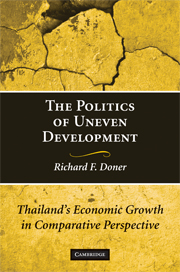Book contents
- Frontmatter
- Contents
- List of Tables and Figures
- Acknowledgments
- List of Abbreviations
- 1 The Challenge of Uneven Development
- 2 Puzzles of Thai Development in Comparative Perspective
- 3 Development Tasks, Institutions, and Politics
- 4 Origins and Consequences of Thailand's Intermediate State
- 5 Sugar
- 6 Textiles
- 7 Automobiles
- 8 Conclusion
- Appendix
- Bibliography
- Index
5 - Sugar
Published online by Cambridge University Press: 05 June 2012
- Frontmatter
- Contents
- List of Tables and Figures
- Acknowledgments
- List of Abbreviations
- 1 The Challenge of Uneven Development
- 2 Puzzles of Thai Development in Comparative Perspective
- 3 Development Tasks, Institutions, and Politics
- 4 Origins and Consequences of Thailand's Intermediate State
- 5 Sugar
- 6 Textiles
- 7 Automobiles
- 8 Conclusion
- Appendix
- Bibliography
- Index
Summary
The sugar industry exemplifies both the impressive diversification and the modest upgrading characteristic of the broader Thai economy. In the mid-nineteenth century, the Thai sugar industry was robust and promising: taxes on the industry constituted the largest source of cash revenue for the government, and British colonial officials predicted that Thailand would become a major sugar exporter. However, competition from colonial plantations elsewhere in Southeast Asia largely destroyed the Thai sugar industry, and by 1950 it was unable to produce enough sugar to meet domestic demand. The classic postwar study of the Thai economy concluded “there was no prospect of exporting sugar from Thailand.”
Yet the industry revived and thrived. Sugar production rose from 35,000 tons in 1953–1954 to an annual average of 5.3 million tons from 1995 to 2000. Sugar exports rose as well, from under 2,000 tons in 1961 to over 5 million in 2002 making Thailand one of the world's three largest exporters along with Australia and Brazil. Between 1993 and 1999, sugar brought in more net foreign exchange for the Thai economy than any agricultural product except rice. With 46 sugar mills and over 100,000 farms, the industry employs over 1 million people.
Comparative advantage only partially explains this turnaround. While Thailand has soil and weather conditions well suited to growing sugarcane, so do the Philippines and Brazil.
- Type
- Chapter
- Information
- The Politics of Uneven DevelopmentThailand's Economic Growth in Comparative Perspective, pp. 141 - 181Publisher: Cambridge University PressPrint publication year: 2009

